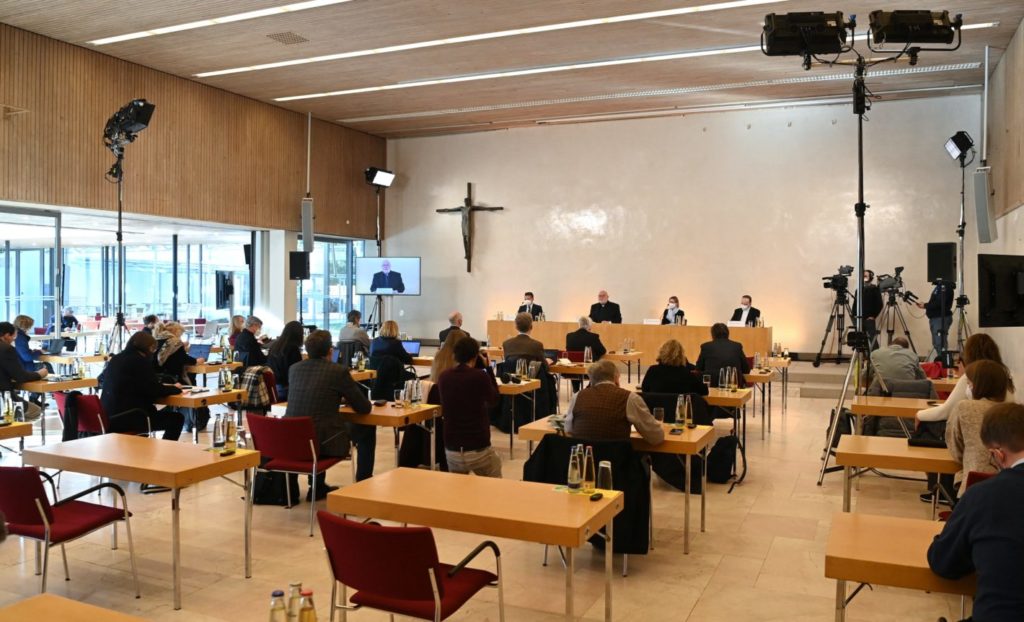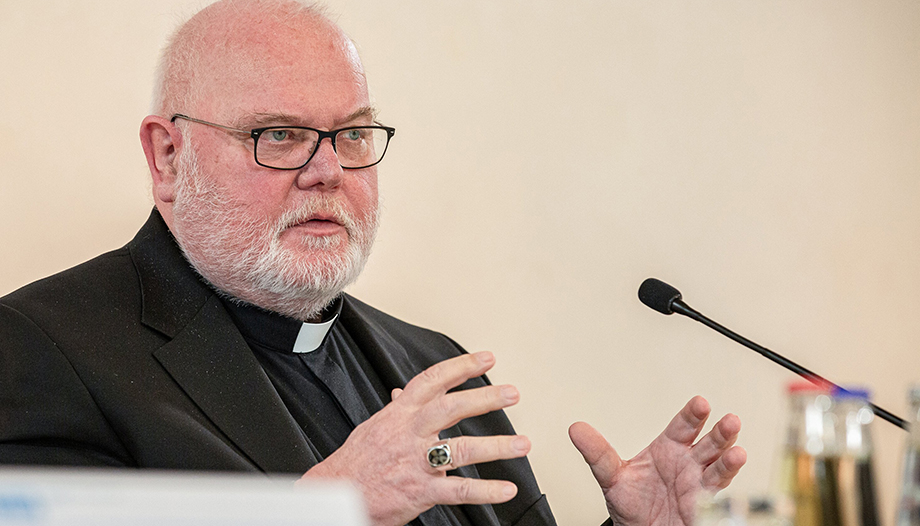On January 20, a report was presented in Munich on sexual abuses committed in that diocese in the long period of time from 1945 to 2019. During those 75 years, six cardinals ruled the diocese, the last three of whom are still alive today: Joseph Ratzinger/Benedict XVI (1977-1982), Friedrich Wetter (1982-2008) and Reinhard Marx (since 2008). The WSW report - so named by the three partners of the law firm Westpfahl Spilker Wastl, to whom the diocese itself commissioned the investigation - concluded, in its more than 1,200 pages, that at least 497 people had been victims of sexual abuse committed by 235 people (182 clerics and 53 lay people).
In public opinion, attention has focused not so much on the victims or the perpetrators of abuse themselves as on the reaction shown mainly by the three prelates mentioned in response to cases that occurred during their respective administrations and in which they were blamed for "not having reacted adequately or in accordance with the norms to cases of (alleged) abuse that had come to their attention."
The WSW report put the figure for such inadequate action at four cases due to the then Cardinal Ratzinger, at 21 cases in relation to Cardinal Wetter; Cardinal Marx was reproached for not having acted correctly in two cases and, moreover, "not having attached the necessary importance to the issue", for having begun to deal with it directly only in 2018, ten years after arriving at the See of Munich.
Special interest on Benedict XVI
As was to be expected, the possible involvement of the Pope emeritus aroused particular interest, especially in one particular case, since the WSW report devoted an additional volume of more than 350 pages to him: it concerned a priest "H." (in the report also called "X" or "Case X"), who in 1980 moved from the Diocese of Essen to Munich for psychiatric treatment. (in the report also called "X" or "Case X"), who in 1980 moved from the Diocese of Essen to Munich for psychiatric treatment. The first question was whether the then Cardinal Ratzinger was present at a working session of the Munich Curia on January 15, 1980, at which the matter was discussed.
In an 82-page brief in which the Pope emeritus responded to questions posed by the law firm WSW, he said he did not recall being present at the meeting. However, in a statement submitted by his secretary, Archbishop Georg Gänswein on Jan. 24, while announcing that Benedict will soon make a more comprehensive statement, he qualified that statement: "However, he wishes to clarify now that, contrary to what was stated at the hearing, he did attend the meeting of the curia on January 15, 1980.
Therefore, the contrary statement was objectively wrong. He would like to emphasize that this was not done in bad faith, but was the result of an oversight in the wording of his statement. He very much regrets this error and asks to be excused. However, it is factually correct, and documented in the files, to state that no decision was made at this meeting regarding the pastoral assignment of the priest in question. On the contrary, only the request to provide him with accommodation during his therapeutic treatment in Munich was granted."

Indeed, in the minutes of the session - collected in the WSW report - we read: "The Diocese of Essen asks Mr. H. to stay for some time with a priest in a parish in Munich. He is to undergo psychotherapeutic treatment". The curia gave its consent to this at this meeting. In the documents on the matter there is also a more detailed note from the personnel officer of the diocese: "The Diocese of Essen requests the temporary admission of a young chaplain who comes to Munich for psychotherapeutic treatment. The chaplain is very talented and can receive various assignments. It is desired that he stay in a good parish in the home of a sympathetic colleague. The written request from Essen has been received." The personnel officer suggests the parish of St. John the Evangelist in Munich as a possible "destination". However, no decision was made at the meeting about the possible pastoral work of such a priest. Above all, the meeting did not discuss the background of H. Therefore, the Pope Emeritus can rightly declare today that he had "no knowledge" of it. When, later, H.'s sexual misconduct in Munich came to light, Ratzinger had already moved to Rome.
This has also been confirmed by Cardinal Wetter - who has published a response to the accusations made against him, in which he sincerely apologized for everything that happened and for "my erroneous decision in the case of the priest H. with regard to his pastoral assignment". Cardinal Wetter describes his relationship to the case in detail: "As I recall, the first time I came into contact with the case of H. was when the question arose as to whether he could return to pastoral work after his misconduct. The decision - which I took after intensive consultation in the diocesan curia - to send him to Garching/Alz under strict supervision was undoubtedly objectively wrong. I did not think it necessary to have the complete dossier transferred to me from the beginning, since H. had already been working in Munich for quite some time. That was already a mistake. If I had known all about the past, I am convinced today that I would have had him returned to Essen instead of sending him to Garching."
"Without a renewed Church there will be no future for Christianity in our country."
When the report was presented on January 20, Cardinal Marx summoned the media to a press conference for Thursday, January 27, in order to present, after the study of the report in the bishopric, "some first perspectives and to outline the way forward". At the press conference he was shocked by the results of the WSW report, which "represents a before and after for the Church in the archdiocese and beyond", because it shows "the dark side that from now on will be part of the history of our archdiocese"; for many people the Church has become a "place of misfortune instead of a place of salvation, a place of fear and not of consolation". Despite the great commitment shown by priests and other people working in the Church "there has been this dark side that has been coming more and more to light".
The Cardinal described as "completely absurd" to speak of an "abuse of abuses" to oppose a "reform of the Church". This, he added, is what he told the Pope in the letter in which he resigned from the episcopal see -a resignation that Francis did not accept-: "for me, confronting sexual abuse is part of an integral renewal and reform, as the synodal path has assumed. Without a renewed Church there will be no future for Christianity in our country".
The "greatest fault" consisted in having "ignored the people affected", which is unforgivable. "We had no real interest in what had happened to them, in their suffering." According to Marx, "this also has systemic reasons", namely the clericalism of which Pope Francis also speaks; it is therefore of particular relevance to have set up last year an advisory board of those affected and an independent commission to confront the past, "which have already provided us with essential impulses from their perspective".
Resignation from office?
He also referred to the resignation presented to the Pope in May 2021: "Personally, I say it again clearly; as archbishop - according to my moral conviction and as I understand the office - I am responsible for the performance of the archbishopric. I am not attached to my office. The offer to resign last year was serious; the Pope made another decision and asked me to continue my ministry responsibly. I am willing to continue to exercise it, if it is a help for the next steps; but if I come to the opinion that I am more of an obstacle than a help, I would speak to the consultative bodies and have them question me critically. In a synodal Church I will no longer make that decision on my own".
The only personal consequence taken so far concerns Lorenz Wolf, Judicial Vicar of the diocese since 1997, who had been severely criticized in the WSW report: 104 cases in which he is involved give "occasion for criticism", as well as being accused of "putting the interests of the defendants above those of the alleged victims". Wolf wrote to Cardinal Marx renouncing his charges; at the press conference, the Cardinal said: "I agree with him; in due course he will take his position" on the accusations.
Responding to a journalist's question ("Who is telling the truth, the Pope emeritus or the report?"), Marx replied that so far he has no information "that makes me conclude that the Pope emeritus has covered up"; on the other hand, he cannot say that the WSW law firm "has not worked cleanly"; but his report is "neither a judicial sentence nor a judgment of history", but an element to confront the past. The final verdict will be determined by the talks and discussions to be held now, as well as what the experts contribute. In addition, Marx said that it was first necessary to wait for the statement that Benedict XVI has announced. However, his impression is that the Pope emeritus has collaborated constructively with the authors of the report.
On homosexual priests
Reinhard Marx also responded to a question about homosexual priests: no one is obliged to expose his sexual inclination; "but if he does, we must respect it; being homosexual should not be a restriction to the possibility of being a priest". He thus expressly dissociated himself from "some brothers in the episcopate" for not considering homosexuality an obstacle to priestly ordination.
However, he added that all priests - regardless of their sexual orientation - are expected to live celibacy. "At the moment, this is the requirement for the priesthood." Referring to the recent #OutInChurch campaign to change the Church's labor law, Marx said, "If we say that a homosexual relationship is perhaps not a marriage according to Church teaching, but we also positively accept it as a binding relationship," then this should apply to all. The Church's labor law should also be changed in this regard. And Vicar General Christoph Klingan added that there is currently an episcopal working group that is "working intensively on a proposal on how to change this ecclesiastical norm."





 Report on sexual abuse in Munich diocese tries to implicate Benedict XVI
Report on sexual abuse in Munich diocese tries to implicate Benedict XVI





